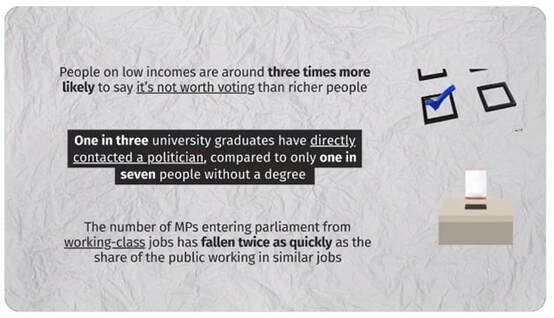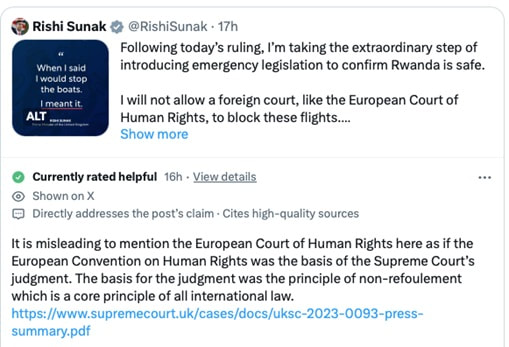GEARING UP FOR A GENERAL ELECTION - HOW CAN CHARITIES MOBILISE TO CREATE THE CHANGE WE NEED TO SEE?11/1/2024 If you could have one thing in 2024, what would it be? Very high on my list is a General Election and a change of Government, as soon as possible. With an Autumn Election currently looking most likely (assuming we believe that Rishi Sunak is telling the truth *cough cough*), it’s time for the charity sector to start mobilising and planning what we can do to bring about the change we need. Having worked in the charity sector throughout 13 years of austerity, I’m unlikely to be a fan of any Tory Government. Even so, this is a Government like no other - looking beyond ideology and policy, we're being governed by a bunch of nasty, self-serving, talentless political vandals who have heaped never-ending misery on the most vulnerable people in society, as part of their increasing desperate bid to stay in power. This summary barely scratches the surface, but we have seen them:
Sometimes you have to pause the remember the sheer scale of the damage that's been done, because it's been going on for so long that there's a risk of becoming desensitised. And now we have a rare chance to reject the cruelty and political vandalism. As charities and charity sector professionals, we often feel hopeless and helpless about the state of the world and the plight of the people we care about. But 2024 will bring a precious opportunity to make a difference. It’s the first time in my adult life where it feels like there’s a genuine prospect of a swing away from a Tory Government. And frankly, if we're not making that a priority, what else are we doing with our time that's going to have a bigger long-term impact? So this blog is a rallying call to everyone in the sector that I’ve ever worked with - let’s build our belief that we can bring about change, and start sharing ideas about how. Firstly, two important caveats...One: I’m under no illusions that a different Government will fix everything. While conventional wisdom says Labour are the only electable alternative, I dislike a lot of what Keir Starmer says - in many policy areas, Labour are uncomfortably similar to the Tories. But while a Labour Government won’t change nearly enough - at least in the short term - it should immediately mean less incompetence, corruption and dog-whistling cruelty. If achieving real social change is like running a marathon, then a Labour Government equates at the very least to buying a pair of reasonably-fitting running trainers – a small, but vital, first step. Two: I know that many charities are understandably nervous about any form of campaigning or perceived political activity. It's worth noting that new Charity Commission guidance says that “Charities can take part in political activity provided it supports their purpose and is in their best interests” - but political activity can’t become the reason for your existence, and you mustn’t give your support to a political party. Electoral law also requires charities to monitor and in some cases register how much they spend on specific regulated campaign activities. There are other requirements too. If you're a registered charity, you should absolutely familiarise yourself with this guidance, but it shouldn't deter you from being active and vocal. There’s loads that we all can and should do this year - and it's primarily about promoting healthy democracy, and empowering people who rarely have a voice, not supporting any particular political party. It just so happens that it's also likely to help bring about the change that we so desperately need. Gearing up for a General Election - five things we can be doing as charities and social enterprises1. Encourage people to go out and voteA new report from the charity and progressive think tank IPPR highlights the alarming gap in political engagement between different socioeconomic groups. Wealthy people, homeowners and graduates are far more likely to vote and engage in politics - this has huge implications for democracy and tackling inequality. So encouraging and empowering your service users to simply go out and vote - even if you say or do nothing else - will change Election results and challenge the status quo. Your organisation is ideally placed to do this - the people you support already know you and trust your frontline staff. So you could:
Lloyds Bank Foundation published this guide for small charities ahead of last year’s local elections, including some very helpful tips on how to support people to vote. 2. Engage your service users and supporters around key policy issuesBrexit showed us that there can be a huge and problematic gulf between the views of a charity's leadership and its service users. While organisations planned for and talked with confidence about a Remain outcome, many of the vulnerable and politically disengaged people they supported were being seduced by Leave campaign promises. My impression is that most charities spent little time bringing people together to discuss and learn from each other's views. In hindsight, this was a mistake and a missed opportunity. Ahead of a General Election, we need to learn from this and get a lot more vocal about engaging our own audiences. Your service users will very likely be impacted by the Election outcome and the headline policies that will form part of the political parties’ campaigns. You should look for opportunities to link key policy debates with the real-life issues that your service users are facing, and the causes that inspire your supporters. This isn’t about telling people how to vote, but making their vote feel more relevant, important and impactful. For example, you could do this by writing blogs, sharing relevant petitions, or linking to articles and reports on social media. Even the smallest charity has the power to reach and engage someone new - and for every organisation that stays silent, an opportunity is missed. 3. Combat disinformationThere’s going to be a LOT of disinformation circulating ahead of this Election. Meat taxes and “illustrative” northern infrastructure projects, anyone? Beyond the usual bare-faced lying, expect deepfake technology to be a new battleground: videos appearing of people saying things they never actually said, and even people casting doubt that things they did actually say were deepfaked. Sound confusing? It will be, and there are growing fears that we’re not ready for it. Every charity can play a simple role in combatting disinformation and amplifying truth. This might involve linking to relevant fact-checking sites, drawing on your own expertise to show why policy promises won’t work, and sharing warnings about deepfakes. As another helpful tool, Twitter (still not calling it X) now has a “community notes” function to provide context on misleading tweets, for example: 4. Add your voice to those championing the sectorCharities should have a vital role to play in shaping policy - they work closely with society’s most vulnerable people, their frontline work means they understand community and healthcare settings better than most, and they’re usually the first ones on the scene when society’s safety net fails those in need. Yet charities - and by extension lived experience - have been repeatedly ignored and marginalised by this Government. And when it occasionally remembers they're here, it’s usually to criticise or disempower them - for example threatening to fine them for helping homeless people, or cooking up fake controversies about donation acceptance policies. A General Election brings the possibility of a new Government that might work more constructively with the sector. More immediately, there's an opportunity to encourage all political parties to listen to charities and factor in their needs and views as they shape their election promises. This helps to gradually shift the Overton Window and change what matters to people and what gets talked about. Achieving this takes a coordinated effort - we all need to take opportunities to contribute our ideas and voice. For example, NCVO has published a draft Charity Sector Election Manifesto with five key themes, and you can share your feedback and ideas until mid-February. Local sector infrastructure organisations will be doing their own consultation. Your contribution will help to ensure that our sector is more representative of everybody, and enjoys a higher profile ahead of the Election. 5. Factor a change of Government into your strategic planningFinally, if you’re planning a new strategy this year, be sure to think ahead to what a change of Government (or simply a change of local MP) might mean for your organisation.
What potential policy changes do you want to be ready to capitalise on or challenge? Which aspects of your work might become harder or easier? Who do you need to be building relationships now as their influence grows - and similarly, what connections do you stand to lose and how might you compensate for that? This final point isn't related to the Election itself, but will ensure you’re ready to take advantage when change does come. Because finally - and with your help - hopefully we can look forward to more than just the status quo in 2024.
3 Comments
Pat Ramsey
11/1/2024 09:09:31 am
We are not a campaigning organisation as per our Memorandum and Articles. Hence, future communications should only be about training.
Reply
Colin Pantall
12/1/2024 02:10:14 pm
Thank you for that clarity, in particular on the criminality, self-serving greed and venality of this government.
Reply
Ally Rea
17/1/2024 03:28:57 pm
Can we vote for *you*?
Reply
Leave a Reply. |
Like this blog? If so then please...
Categories
All
Archive
May 2024
|
Lime Green Consulting is the trading name of Lime Green Consulting & Training Ltd (registered company number 12056332)




 RSS Feed
RSS Feed